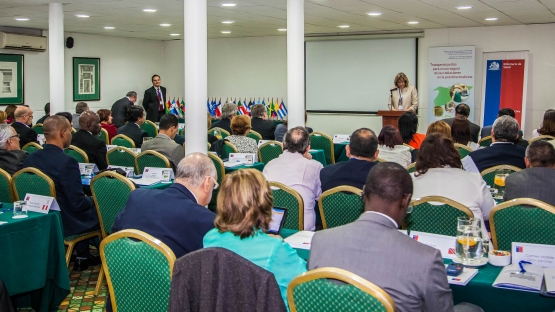Sound regulatory frameworks based on IAEA safety standards and effective communication are essential to ensuring that radiation used in medicine provides benefits to patients while minimizing risks. This was the consensus among participants of a seminar on the safe use of radiation in medicine held in Chile from 23 to 27 March 2015. The seminar addressed radiation safety in medical practice, including the implementation of international Basic Safety Standards (BSS), which play an important role in how radiation safety is addressed globally.
"The 2014 BSS are new safety standards that have to be applied on an urgent basis towards preventing unwanted effects of radiation sources," said Chile's Minister of Health Carmen Castillo Taucher during the opening session of the seminar. "It is particularly important to have an in-depth discussion in this seminar of available mechanisms to safeguard medical professionals and users of the health system."
In medical practice, ionizing radiation is an important tool used to diagnose and treat cancer, tumours and other communicable and non-communicable diseases. However, its improper use can cause serious injuries to patients or health professionals administering radiation. The BSS establishes the legal and regulatory foundation for setting up comprehensive systems of protection and safety against all types of radiation exposure situations, such as emergency exposure situations and exposure stemming from medical practice.
Working together
Under the seminar slogan 'working together for the safe use of radiation in medical practice', more than 70 government representatives and experts from 25 countries of Latin America and the Caribbean, as well as Spain and the United States, deliberated on accelerating the implementation of the latest BSS in medical practice, unveiling existing gaps and obstacles that may prevent swift implementation. They also discussed the role of state-designated radiation safety regulatory authorities in minimizing the risk of radiation injuries, unnecessary doses and poor quality diagnosis and treatment using radiation.
"Setting the regulatory framework for radiation safety in a country to implement the BSS is a prerogative of its Government; however, what is indispensable is that the competent authorities are empowered to exercise effective independence in regulatory decision making and provided with enough resources to deliver assigned duties," said Ronald Pacheco, from the IAEA Regulatory Infrastructure and Transport Safety Section.
One notable point raised at the meeting was that the distribution of regulatory competences for radiation safety across the region is diverse; the majority of the countries have a mixed system, with regulatory functions assigned to the ministries of health in conjunction with other governmental institutions. Others have given the sole responsibility either to the health ministry or to a dedicated institution.
Lack of formal agreements, effective communication and coordination among the competent authorities were identified as widespread issues in countries following a mixed system. On the other hand, in the countries with a dedicated authority, a comprehensive regulatory supervision of all the practices using radiation, including medical, research and industrial applications is not always ensured.
Among other conclusions was the urgent need to design and put in place an effective communication strategy targeting high ranked authorities and decision makers within health authorities. The cooperation between the IAEA and the Pan-American Health Organization (PAHO) to convey this message was underscored as a key factor to achieve success in this endeavour.
Joining forces for strategic cooperation
The seminar was co-organized by the IAEA, the PAHO, the International Radiation Protection Association (IRPA), the US Nuclear Regulatory Commission (NRC) and the Ibero-American Forum of Radiological and Nuclear Regulatory Agencies (FORO), in cooperation with the Government of Chile through the Ministry of Health. In preparing the seminar, great care was taken to ensure that the largest number of countries of the region could participate in the meeting and benefit from the lessons learned with the support of available cooperation programmes.
"Seminars like this one are possible thanks to the cooperation programmes of the IAEA and PAHO and also to the commitment and permanent support of strategic partners like the US Nuclear Regulatory Commission and the Spanish Nuclear Regulatory Council that contribute to the design and implementation of high quality technical cooperation projects," said Pacheco.
The 2014 Basic Safety Standards are new safety standards that have to be applied on an urgent basis towards preventing unwanted effects of radiation sources.


